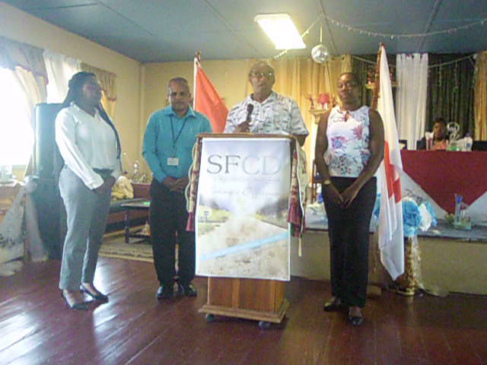
The St Francis Community Developers, in collaboration with Food For The Poor Guyana (FFTP) Inc, is moving to enhance the housing situation in Region Six (East Berbice-Corentyne).
In Region Five (Mahaica-Berbice), the two organisations have already established two villages – one at Hopetown and another at Trafalgar.
St Francis President Alex Foster said the project was first established in Region Five because of the existence of housing co-ops, thus, making it easier for the establishment of villages.
At Trafalgar, a playpark, which is being considered the largest imported outdoor facility in Guyana, has been erected.
Meanwhile in Region Six, St Francis has been able to acquire land from the Guyana Lands and Surveys Commission (GLDS) at Williamsburg and Rose Hall Town, Corentyne.
The project will see 100 house lots being established.
According to Foster, the project is expected to include new public open spaces.
“We want to establish a playschool and other facilities which would benefit the residents of that new community. So, we would be able to empower them in the initial stage. We will start by setting up 60 houses on the land and then we will add 40 more in Phase Two of the project,” Foster said.
He noted that scores of persons have applied for new houses and the interviews with applicants are expected to commence to select those who would benefit from the new housing project.
To date, meetings have been held with the Guyana Power and Light (GPL); the Region Six Administration; the Department of Education; the banking sector; the Central Corentyne Chamber of Commerce (CCCC); the fire department and the Police in the region.
According to Foster, 26 organisations have so far participated in meetings involving the setting up of the new Village.
Meanwhile, FFTP Senior Manager of Projects, Andrea Benjamin, speaking on the project last Thursday at St Francis, where they had gathered for another event, said the agency was happy to be partnering with St Francis on the housing project.
“We have been working in Region Six for a number of years to improve housing quality,” she noted.
She said an early childhood development centre and play park would also be included in the village, which is also to have a community resource centre and an agricultural plot.
Benjamin further explained that the FFTP would be assisting families living there with life and training programmes.
“The aim of this project is not only to build houses and provide adequate housing, but to create a sustained community. We will be providing accommodation; we will be having life and skills training programmes, recreation for the children in order to keep them active to ensure that the community mortgages. When you bring families from different backgrounds and different communities it is important to have an area where they can actually congregate and where you can learn about each other and get to know each other holistic. So, you create a holistic community,” she said.
Benjamin noted that the FFTP would not be funding the project solely, and was open to support from other organisations or individuals.
“We will have to develop the community in terms of roads and dreams, and Food For The Poor will not be undertaking that. So, we will be looking to support from the Regional Administration and the Government of Guyana, from the Private Sector…”
Meanwhile, the houses will be furnished and homeowners will be provided with solar panels.
“So that they can have electricity. So, when we give them the house for those who do not have anything, they can move in immediately,” Benjamin added.
FFTP Chief Executive Officer (CEO) Kent Vincent said he has seen small zinc structures with as many as six persons living in them. Those environments, he said, was heart-breaking to the FFTP.
“We feel very happy to be able to provide decent housing for those who are in need. These are people who cannot go to the bank to get loans to build because they do not have the financial resources,” he explained.



